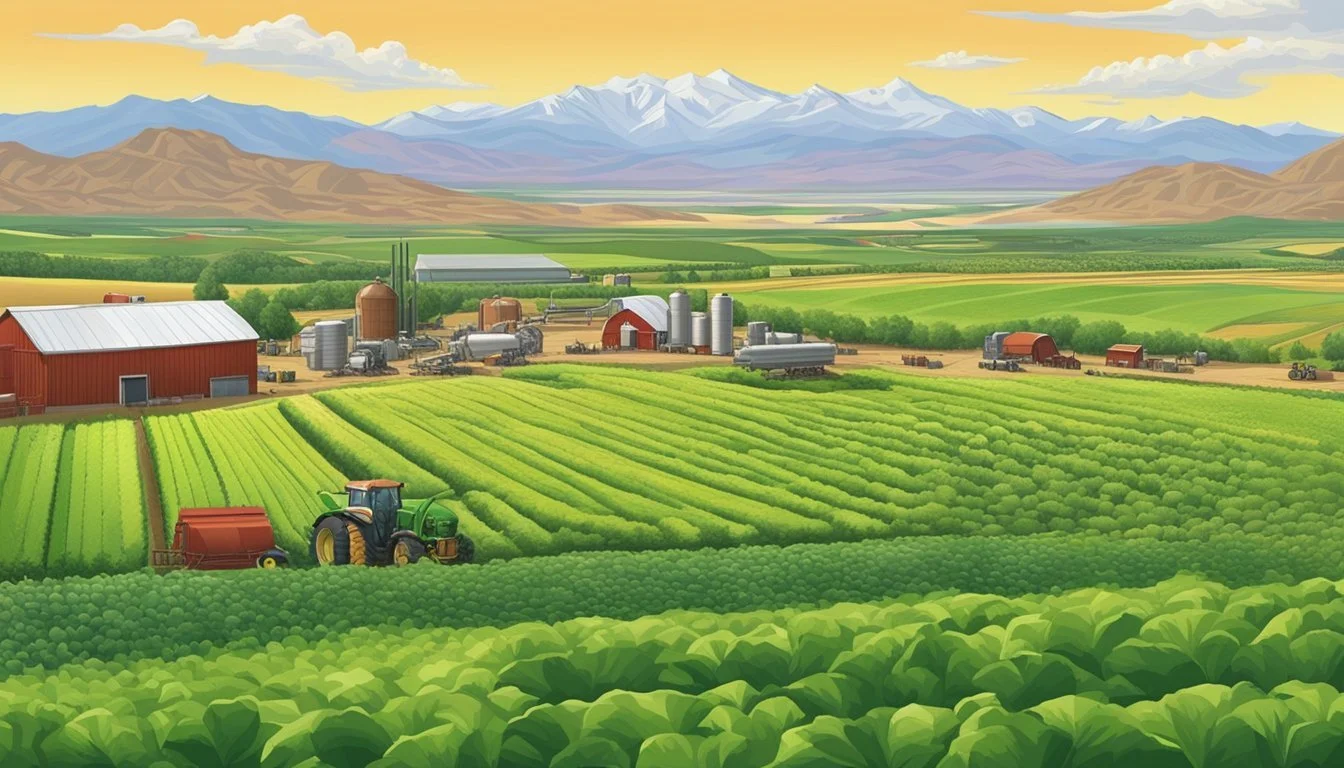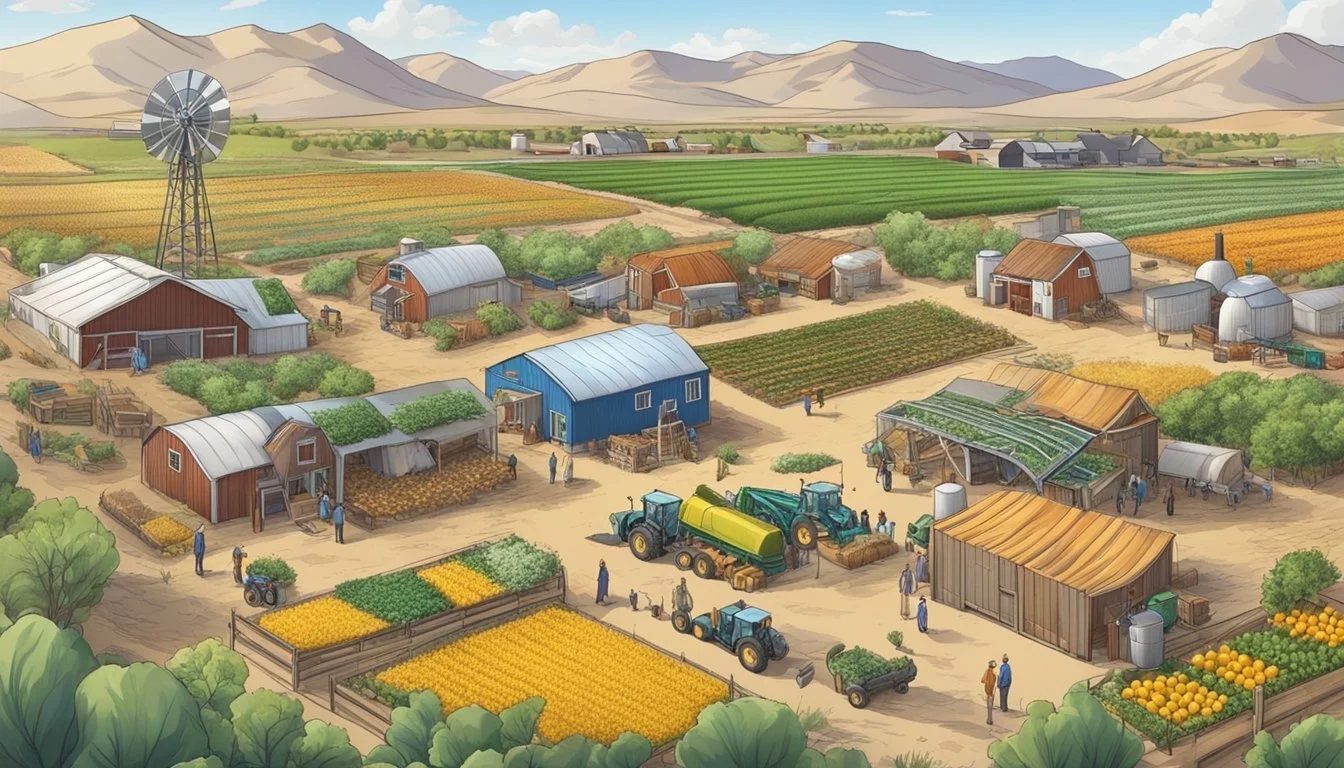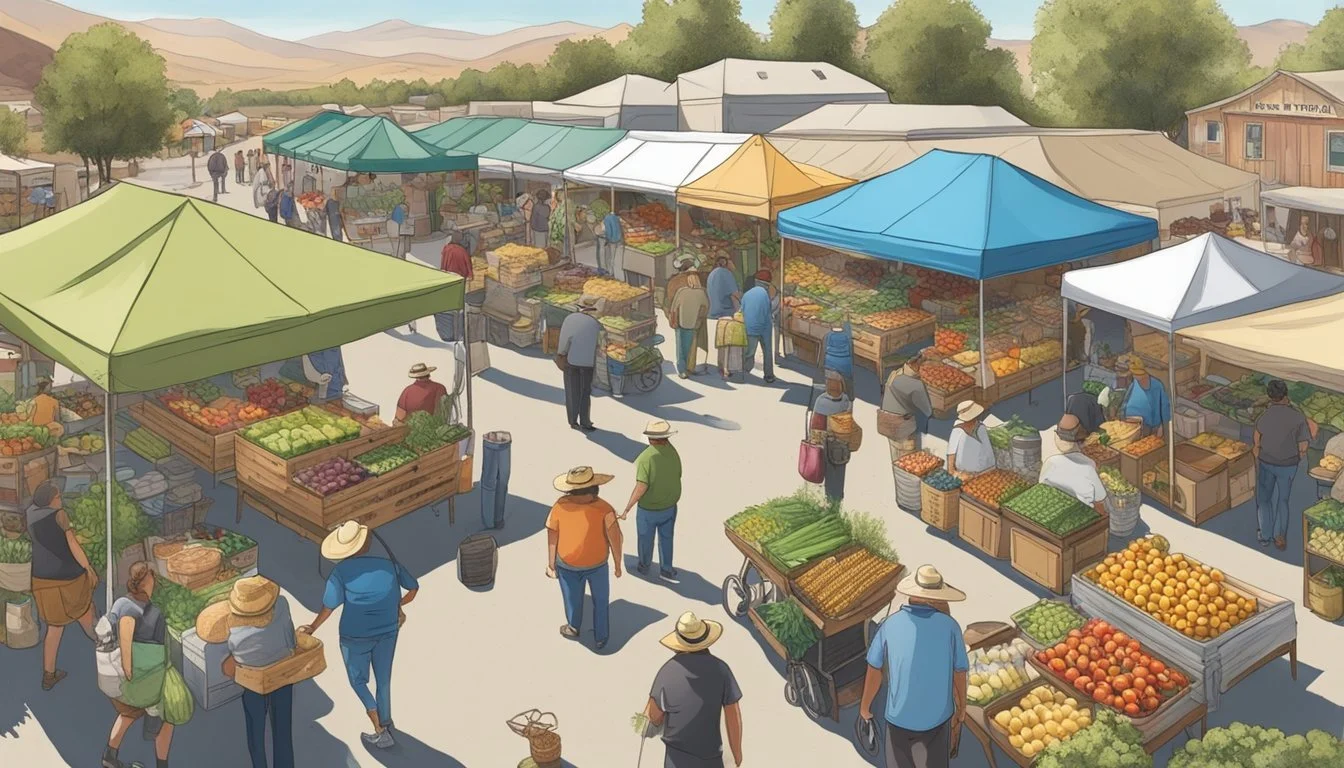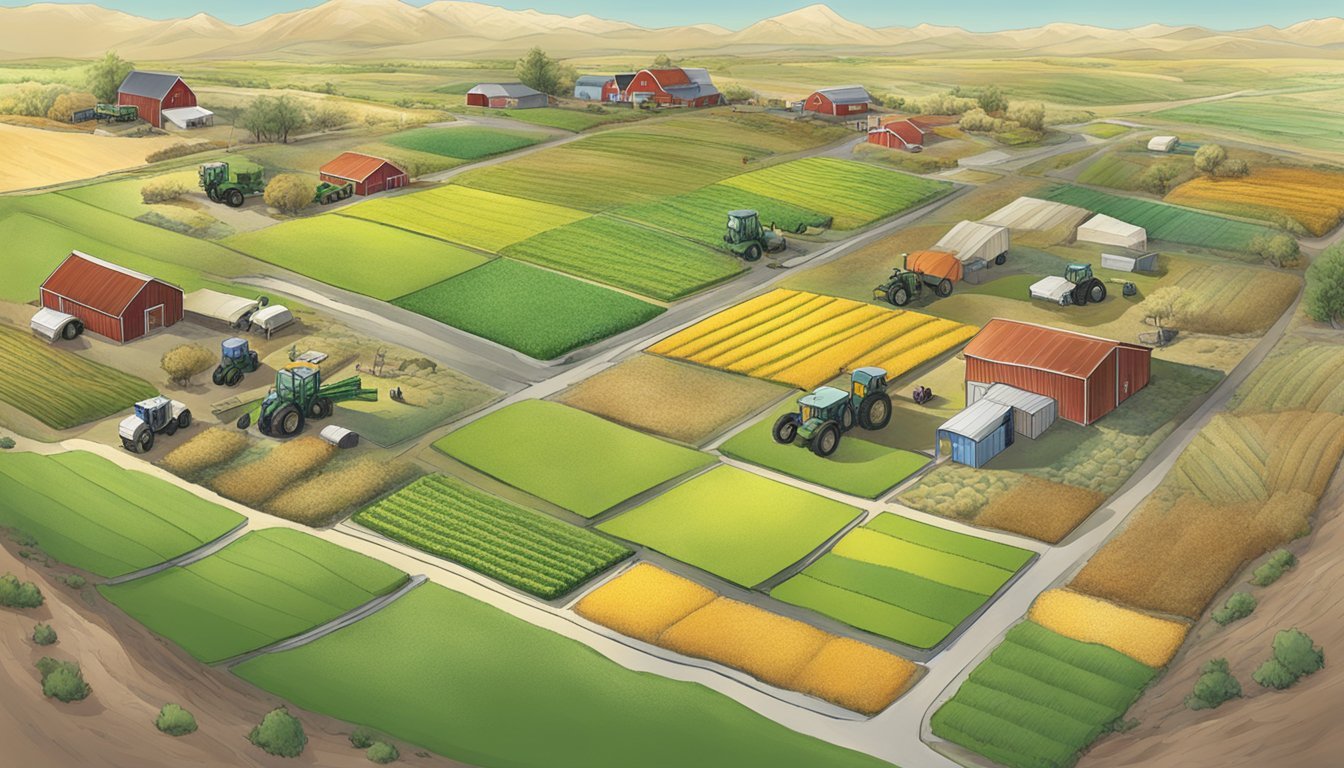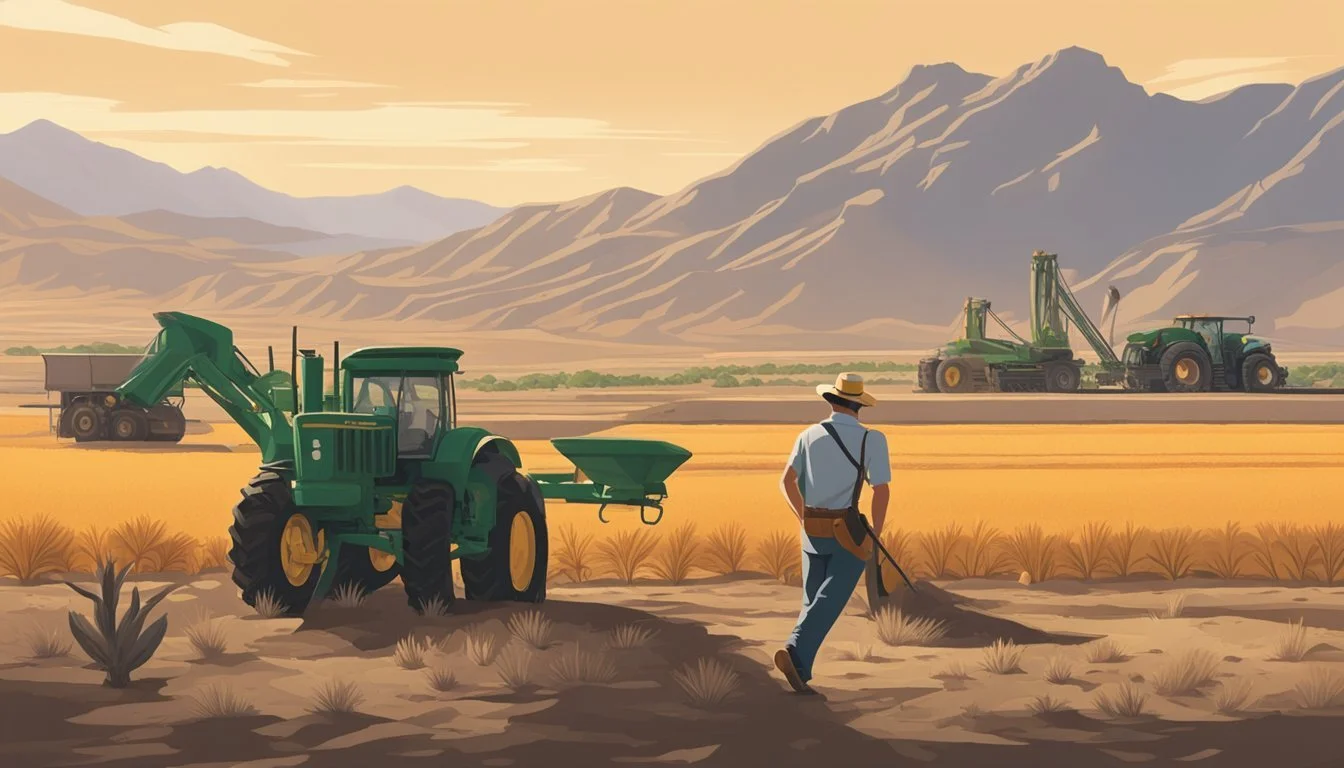Farming Communities in Nevada
Growth, Challenges, and Opportunities
Nestled within the arid landscapes of the American West, Nevada's farming communities showcase a unique blend of resilience and innovation. Farming in Nevada is defined by its adaptation to the state's challenging climate, with farmers making the most of the limited water resources and arable land. Nevada boasts the most farmland for sale in the country, amounting to approximately 900,000 acres, valued at around $167 million. This wealth of available land presents a significant opportunity for both budding and seasoned agricultural professionals.
In the heart of Nevada, areas like Lander County and Nye County are particularly prominent, reflecting the state's diverse range of agricultural activities. These communities are home to extensive ranches and farms that contribute to both local and national food production. Properties such as the Antelope Valley Farm, spanning 640 acres with modern amenities, exemplify the scale and dedication inherent in Nevada's agricultural sector.
Beyond mere numbers, Nevada's farming communities are a testament to human ingenuity. Despite the state's dry conditions, farmers successfully cultivate a variety of crops and maintain robust livestock operations. This success is attributable to innovative irrigation techniques and sustainable farming practices that ensure the longevity of both the land and the communities that depend on it. For those interested in the agricultural potential of the Silver State, these communities represent a thriving and dynamic component of Nevada's identity.
History and Background of Farming in Nevada
Nevada's farming history is deeply rooted in its geography and the settlement patterns of its early inhabitants. Over the years, agricultural activities have evolved, playing a pivotal role in the rural communities and the state's economy.
Development of Agriculture in Nevada
From the mid to late 1800s, regions like Carson Valley developed into thriving agricultural communities. The fertile lands and adequate water supply made it ideal for hay and grain farming. By the 1950s, Douglas County faced a population decline but saw a resurgence from 1970 to 1980 with an impressive 182 percent growth.
Nevada's agricultural community primarily consists of large-family farms, reflecting its extensive land use. Despite a 9% decrease in the number of farms, as recorded in the 2022 Census of Agriculture, the state's farms still managed a market value nearing $960 million. These farms are crucial to the rural economies and offer significant contributions through various agricultural products.
Role of Ranches and Ranching
Ranches are integral to Nevada's agricultural landscape. The state ranks third nationally in terms of ranch size, with an average of 3,500 acres per ranch. This large-scale ranching model supports significant livestock populations, including dairy cows, sheep, lambs, and hogs.
The importance of ranching extends beyond livestock production. It supports local economies and sustains the rural communities. Though fewer in number, these ranches maintain Nevada's reputation as a prominent agricultural state. Ranching not only provides food and products but also preserves the historical and cultural heritage of Nevada's farming communities.
Geography and Climate Influence on Agriculture
The geography and climate of Nevada significantly impact its agricultural practices. The arid environment and limited water resources shape how farming communities manage irrigation and resource conservation.
Arid Climate and Farming
Nevada is the driest state in the U.S., experiencing minimal rainfall and high evaporation rates. This arid climate poses challenges to farming, as water is a scarce resource. Crops and livestock face heat stress, necessitating adaptive strategies.
Farmers often choose drought-resistant crops such as alfalfa, barley, and certain varieties of wheat. The growing season is also influenced by shorter periods of frost-free days, requiring careful planning.
The impact of climate change exacerbates these difficulties. Rising temperatures and increased drought frequencies threaten water availability and soil health. Strategic crop rotation and soil management practices are essential to maintain productivity.
Irrigation and Water Management
Irrigation is crucial for Nevada's agriculture due to the state's limited rainfall. Farmers rely heavily on irrigation systems to supply water to their fields. Efficient water use is vital to conserve this precious resource.
Modern irrigation techniques such as drip irrigation and center-pivot systems help optimize water usage. These methods reduce water waste by targeting the root zones of plants directly. Precision agriculture technologies also monitor soil moisture levels, ensuring that crops receive adequate water without over-irrigation.
Water management involves not just irrigation but also the careful regulation of water sources such as the Colorado River and underground aquifers. Farmers employ water conservation methods, like using cover crops to reduce soil evaporation and implementing catchment systems to capture and reuse runoff water.
Efficient water management strategies are essential to sustain Nevada's agriculture amidst its challenging geographic and climatic conditions.
Types of Farms and Crops
Nevada's farming communities feature a diverse range of agricultural activities despite the state's arid climate. This section delves into the types of farms and crops found in the state, focusing on vegetable and fruit production, livestock and dairy farms, range livestock production, and cash crops and field production.
Vegetable and Fruit Production
Despite the challenging climate, Nevada's farmers cultivate a variety of vegetables and fruits. Key crops include potatoes, onions, and garlic.
Potatoes are grown primarily in well-irrigated areas. Onions thrive thanks to the long sunny days, which support their growth cycle. Garlic, a high-value crop, is also cultivated, taking advantage of Nevada's dry environment, which helps reduce disease issues.
Fruits such as apples and pears are grown in specialized orchard farms. These orchards utilize advanced irrigation systems to ensure the fruit quality remains high. Additionally, small-scale farms often produce melons, which do well in the warm climate.
Livestock and Dairy Farms
Nevada's livestock farming includes the raising of cattle, sheep, and hogs. These farms contribute significantly to the state's agricultural income.
Cattle farming is prevalent, with beef cattle being the most common. Sheep farming also plays a significant role, with wool and meat production being primary activities. Hogs are raised in smaller numbers but are an important part of mixed farming systems.
Dairy farms are fewer but crucial. These farms primarily focus on milk production, catering to both local and regional markets. Advanced feeding and management practices ensure high milk yields and quality.
Range Livestock Production
Nevada ranks third in the nation in the average size of its ranches, with many exceeding 3,500 acres.
Range livestock production involves grazing cattle and sheep on vast tracts of land. Sheep are well-suited to this type of farming due to their ability to utilize the sparse vegetation effectively. Cattle are also extensively grazed, taking advantage of the large open spaces.
These operations rely on sustainable practices to maintain land health, including rotational grazing and water conservation techniques. This helps in preserving the rangeland for future use while ensuring livestock productivity remains high.
Cash Crops and Field Production
Alfalfa hay is Nevada's leading cash crop. It is extensively grown due to its high nutritional value and resilience to the local growing conditions. Alfalfa is mainly sold as compressed bales and cubes, with significant quantities exported overseas.
Grass hay, wheat, and barley are also critical field crops. Wheat and barley are largely grown for both grain and forage. Oats form a smaller but vital part of the crop rotation system.
Additionally, Nevada produces alfalfa seed, which is an essential input for hay production. These seeds are cultivated under controlled conditions to ensure high germination rates and disease resistance.
Agricultural Economy and Business
The agricultural economy in Nevada plays a crucial role in supporting local communities, contributing significantly to the state's economic output through various farming and business activities.
Farming as a Business
Farming in Nevada is a major business, encompassing over 3,122 farms with a market value of agricultural products sold totaling nearly $960 million. Produce and livestock production are primary components, bolstered by the resilient nature of local farmers. Nevada's agricultural sector also supports more than 16,000 jobs, promoting economic stability within rural areas. The state's farmers are continually adapting to the unique challenges of Nevada's arid environment, employing advanced farming techniques to maximize output and efficiency.
Marketing and Local Markets
Marketing plays a critical role in the success of Nevada's agricultural products. Local farmers markets and direct-to-consumer sales help farmers connect with customers, supporting the local food movement. Leafy greens, nuts, and other fresh produce often find a marketplace in vibrant farmers markets across the state. Effective marketing strategies allow Nevada's produce to reach wider audiences, both within and outside the state, ensuring that farming remains a viable and profitable business.
Funding, Grants, and Financial Support
Financial support is vital for sustaining farming operations in Nevada. Various funding options and grants from the USDA and other institutions help farmers invest in modern equipment, infrastructure, and sustainable practices. Access to these resources empowers farmers to enhance productivity and manage costs. Programs aimed at beginning farmers also provide essential startup capital, helping to rejuvenate the sector as older farmers retire. Leveraging financial support mechanisms is key to the longevity and growth of Nevada’s agricultural economy.
Sustainability and Risk Management
Sustainability and risk management are crucial for maintaining an efficient agricultural sector in Nevada. Farmers adopt sustainable agriculture practices to conserve water and soil, essential for crop production amidst the state's harsh climate. Risk management strategies, including diversification and crop insurance, help mitigate potential losses from unpredictable weather patterns and market fluctuations. These practices ensure the long-term viability of farming in Nevada, balancing economic growth with environmental stewardship.
Education, Innovation, and Research
Education, innovation, and research are critical to developing thriving farming communities in Nevada. The University of Nevada, Reno, and other organizations play a significant role in advancing agricultural knowledge and practices.
University of Nevada, Reno Contributions
The University of Nevada, Reno, is a central hub for agricultural education and research in the state. The Desert Farming Initiative (DFI), established in 2013, is part of its College of Agriculture, Biotechnology & Natural Resources. This initiative collaborates with academic and industry experts to conduct applied research and provide hands-on educational opportunities. Facilities like the Valley Road Experiment Station allow students and researchers to explore sustainable agricultural techniques. The university also supports the Nevada Farm Network, which offers resources and networking opportunities to local farmers, enhancing their productivity and sustainability.
Alternative Crops and Experimental Agriculture
The Nevada Farm Network, supported by the University of Nevada, Reno and the U.S. Department of Agriculture, focuses on the production of alternative crops. Specialty crops such as winter squash have seen significant success, with 2023 being a particularly productive year. Research initiatives aim to diversify Nevada's agricultural portfolio by exploring crops that can thrive in the state's unique climate conditions. Experimental agriculture projects at various research facilities provide valuable data on crop yields, pest resistance, and water usage, helping farmers make informed decisions about what to plant and how to manage their farms effectively.
Biological Control and Pest Management
Biological control and integrated pest management are vital components of sustainable agriculture in Nevada. The USDA Farm Service Agency collaborates with local researchers to develop and implement pest control strategies that minimize chemical use. This effort not only protects the environment but also reduces costs for farmers. Programs at the University of Nevada, Reno, focus on identifying and utilizing natural predators of common pests, thereby enhancing crop protection. These initiatives play a crucial role in maintaining high crop yields and ensuring the long-term viability of farming in the region.
Sustainable Practices and Education
Sustainability is at the heart of agricultural education and practices in Nevada. The Desert Farming Initiative promotes techniques that conserve water, reduce waste, and improve soil health. Educational programs and workshops, often in collaboration with community organizations, teach farmers how to implement green practices on their farms. Research on sustainable agriculture conducted at the University of Nevada, Reno, provides valuable insights and practical solutions. Financial support from the Nevada Agricultural Foundation helps fund these educational ventures, fostering a community of environmentally conscious and knowledgeable farmers committed to sustainable farming methods.
Community and Events
Farming communities in Nevada thrive on active engagement and numerous events that foster connection, education, and economic growth. From farmers markets to farm visits, these activities play a crucial role in sustaining the agricultural landscape of the state.
Community Engagement in Farming
Nevada's farming communities emphasize strong engagement. The Nevada Farm Network unites farmers to share resources and knowledge, enhancing efficiency and sustainability. Programs and workshops allow farmers to learn innovative practices, aiming to cultivate a supportive and resilient agricultural community. Urban initiatives, like Flint Street Farm, focus on food security and provide educational opportunities to strengthen urban areas through farming.
Agricultural Events and Farmers Markets
Agricultural events are plentiful, offering valuable interactions among farmers, producers, and consumers. Membership in organizations such as the Nevada Farm Network grants access to a variety of events that promote community learning and collaboration. NevadaGrown supports a range of farmers markets, where locals and visitors can purchase fresh, locally-produced foods. These markets foster a close-knit community by prioritizing sustainable agriculture and healthy eating.
Tourism and Farm Visits
Farm visits are a popular tourist activity, offering a glimpse into the daily workings of Nevada's agricultural sector. Gilcrease Orchard and Jacobs Family Berry Farm provide opportunities for visitors to pick their own fruits and learn more about farming operations. These visits are often available by appointment, ensuring a personal and educational experience. Farms also host events and weddings, making them integral to both tourism and local festivities.
Regulatory and Environmental Factors
Farming in Nevada entails navigating a complex web of regulations and environmental considerations critical for sustainable agriculture. These regulations vary at both state and federal levels, with specific mandates for conservation and resource management.
State and Federal Agricultural Regulations
Nevada's agricultural practices are significantly influenced by regulations set at state and federal levels. The Nevada Department of Agriculture oversees state-specific regulations, promoting sustainable practices and ensuring compliance with the broader directives of the USDA.
Key areas of focus include:
Environmental mandates: Farmers must comply with regulations concerning water usage and environmental protection.
Fuel storage: Exemptions such as those pertaining to farm fuel tanks up to 22,000 gallons are provided to ease operational burdens.
Pesticides and chemicals: Strict controls are enforced to minimize environmental and human health risks.
Resource Conservation and Management
Efficient resource conservation and management are paramount for the sustainability of Nevada's farming communities. This involves strategies for water conservation, soil health, and energy usage.
Important aspects include:
Water management: Given the arid climate, prudent water usage is critical. Farmers implement techniques like drip irrigation to maximize efficiency.
Soil conservation: Practices such as crop rotation and cover cropping help maintain soil fertility and prevent erosion.
Renewable energy: Adoption of solar and wind energy lowers operational costs and reduces environmental impact.
Nevada's municipalities and local agencies often collaborate with farmers to support these initiatives, providing resources and guidance for sustainable farming practices. These collaborative efforts ensure that farming remains both economically viable and environmentally responsible.
Challenges and the Future of Farming in Nevada
Nevada's farming communities face significant challenges due to environmental conditions and shifting demographics. Yet, innovation and sustainable practices are paving the way for a promising future in agriculture.
Overcoming Environmental Challenges
Farmers in Nevada contend with arid climates, limited water resources, and unpredictable weather patterns. These conditions stress the importance of efficient water use and soil conservation.
Water management is crucial. Many agricultural producers have adopted drip irrigation and precision farming techniques to maximize water efficiency.
Soil health is also a priority. Techniques like crop rotation and cover cropping are being employed to maintain soil fertility and reduce erosion.
The state's unique climate requires constant adaptation. Success stories reflect that resilience and careful planning can mitigate many environmental issues.
Innovation and the Future of Agriculture
The future of Nevada agriculture leans heavily on technology and sustainable practices. Urban farming is gaining traction, exemplified by small-scale farms in cities aiming to reduce food miles.
Regenerative agriculture is another promising development. This method emphasizes restoring ecosystems and improving land productivity over time. For example, using composting and natural fertilizers enhances soil health.
Investment in agricultural technology is pivotal. Drones and sensors help monitor crop conditions, and automated machinery reduces labor costs and increases efficiency.
Nevada's agricultural community continually adapts, showcasing a blend of tradition and modernity to secure a sustainable and productive future.




